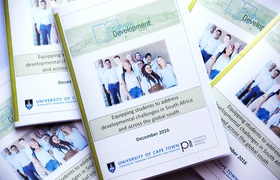Development by numbers
08 August 2017 | Story Kate-Lyn Moore. Photo Pixelbay.
The new postgraduate diploma in survey data analysis for development, out of the School of Economics, has produced its first cohort of graduates.
Put together by DataFirst and the Southern Africa Labour and Development Research Unit (SALDRU) and supported by Statistics South Africa (Stats SA), the course aims to enhance the skills of its graduates in survey data collection and analysis.
Whether it is in attempting to eliminate poverty, combating inequality or in improving education, key development challenges all require accurate survey measures.
The diploma is aimed at developing and maintaining the high quality data that is so fundamental to policy innovation, implementation and monitoring.
Graduate Thapelo Tshabadira, who works as a statistician for the Poverty and Inequality division in Stats SA, commented on the diploma: “My favourite part of the course was learning how to measure poverty and inequality using different techniques, because these are among the most important indicators being used to measure progress in the National Development Plan goals as well as the Sustainable Development Plan.”
First-rate data collection and analysis is essential for several other reasons as well. Most important perhaps is to shape policy interventions on the basis of empirical evidence and to track the implementation of these policies in key areas, such as education, health, or infrastructure delivery.
Improving data quality
The course will help statisticians in government to improve the quality of the data available to policymakers, said senior statistician Ouma Ledwaba of Stats SA.
“For instance, our General Household Survey reports on access to services, and if we are not reporting on the basis of good quality data, the government will not know where they have to focus to improve the lives of the people of the country.
“Where I work, we analyse and do reports. But we are not involved with processes such as weighting of the data. So it was very interesting for me in the complex survey module to learn about how data is weighted,” she noted.
“Whether it is in attempting to eliminate poverty, combating inequality or in improving education, key development challenges all require accurate survey measures.”
The course provided training in both the practical and theoretical use of data sets. This, according to graduate Tshirado Tshirado, is one of its strengths. (Tshirado is a statistician with the Department of Basic Education.)
“This will encourage more people to use data sets, and without them, there is no evidence. It will help improve our work application and our efficiency.”
He added that learning the Stata software programme has improved his coding skills, “which makes my work more efficient than before”.
This 15-month qualification is relevant to individuals wanting to work in a national statistics office, a government department dealing with service delivery, or a development agency.
It is aimed at people with a degree in economics, statistics, demography or other tertiary qualification. In the last instance, evidence of being familiar with data analysis or econometric software will be required.
SALDRU runs a free course every January, “An Introduction to Household Survey Analysis using Stata”, which can provide some background.
For a full breakdown of the course content, visit the DataFirst website.
 This work is licensed under a Creative Commons Attribution-NoDerivatives 4.0 International License.
This work is licensed under a Creative Commons Attribution-NoDerivatives 4.0 International License.
Please view the republishing articles page for more information.










